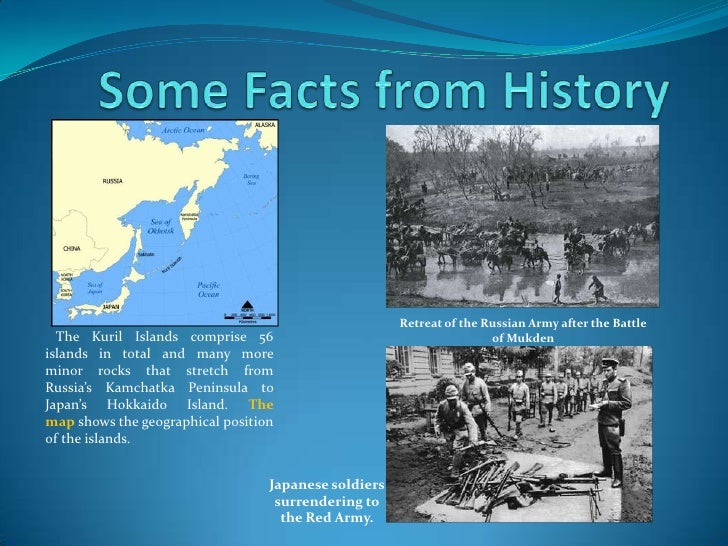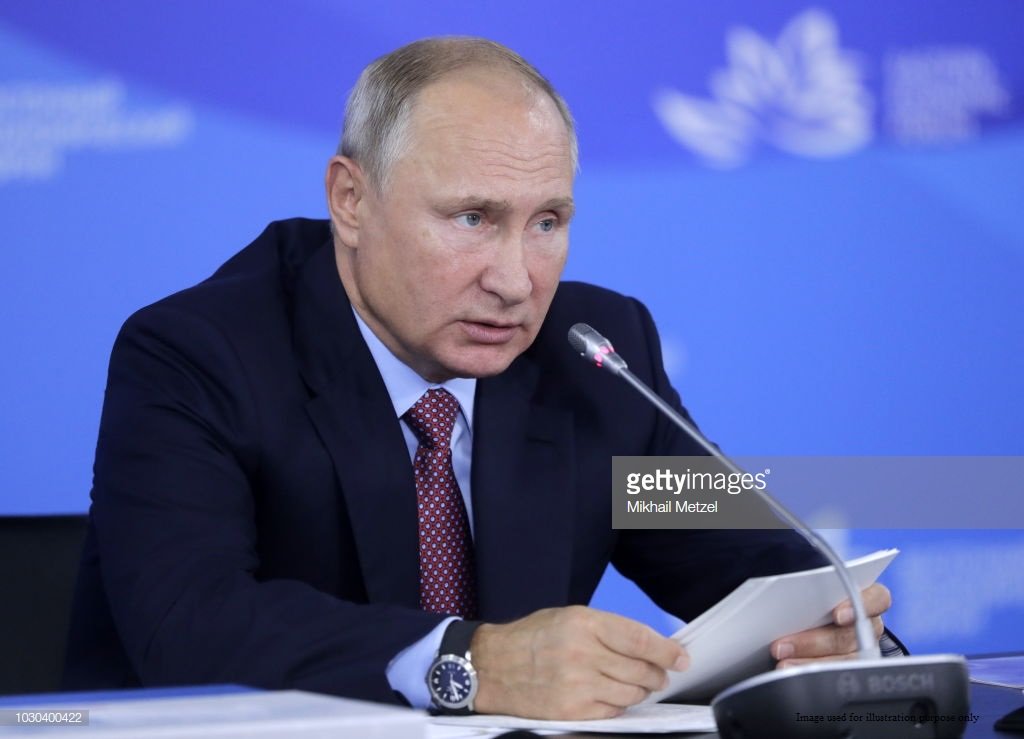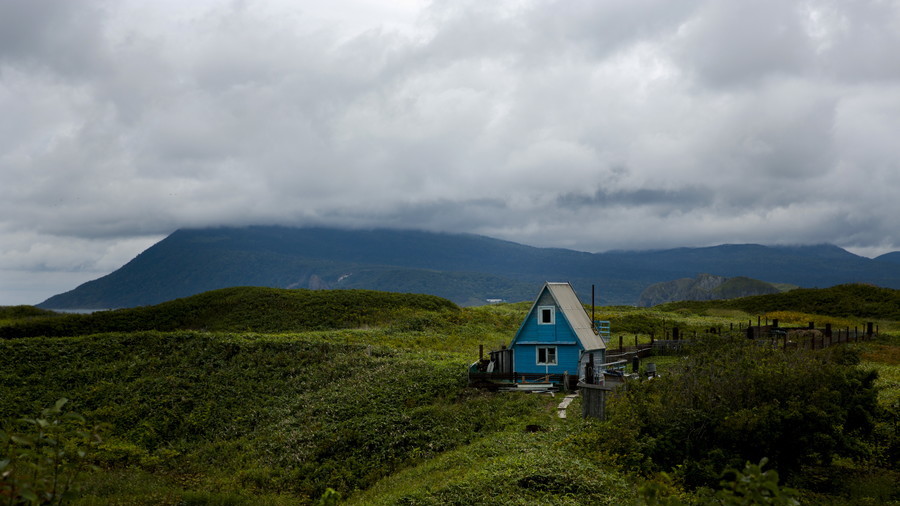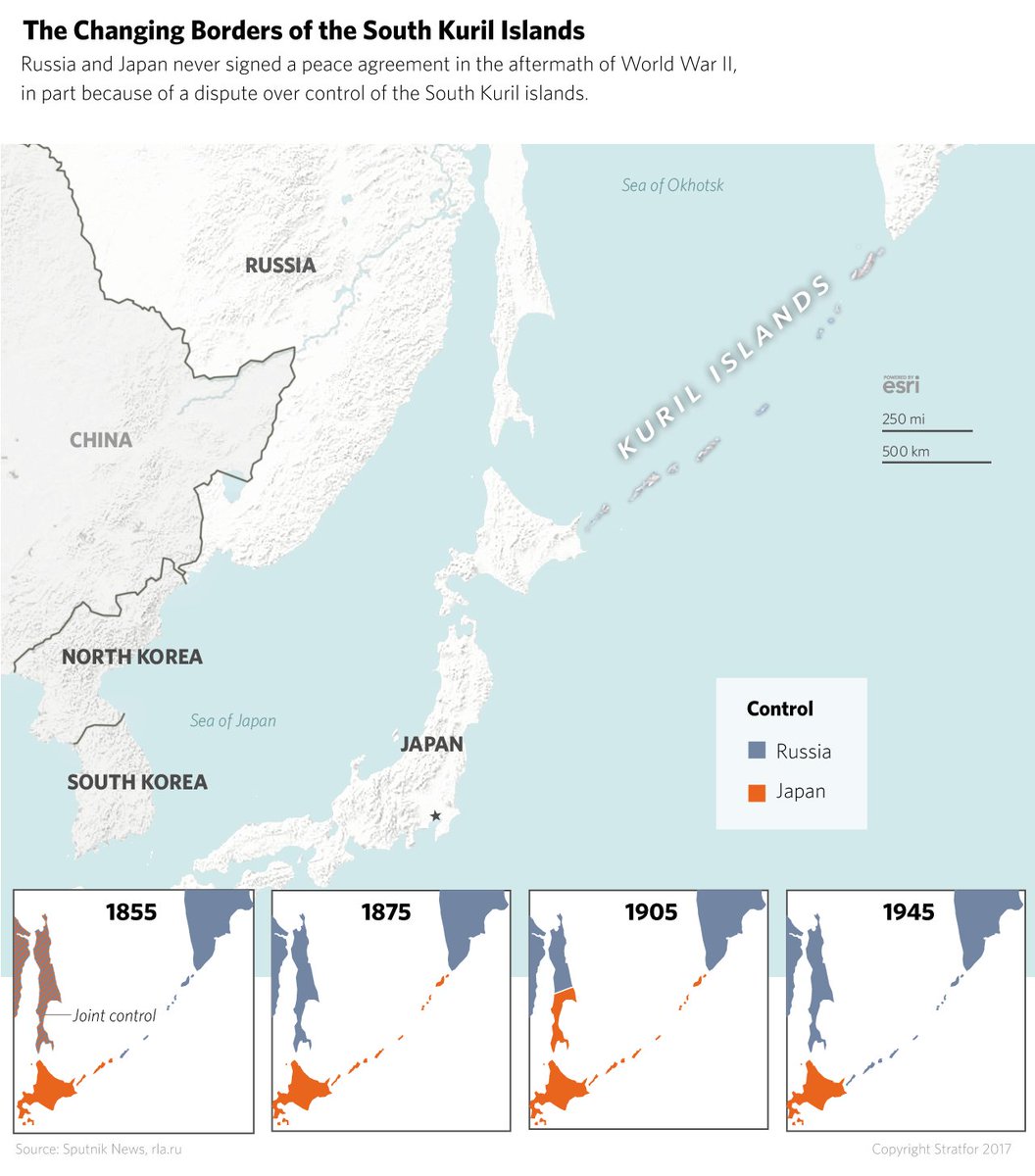|
|
Post by Admin on Jul 17, 2017 18:52:07 GMT
Japan's strategy of trying to incentivize political concessions from Russia with economic sweeteners while maintaining sanctions is a difficult balancing act. Over time, Japan would like to move toward joint administration of the islands, after first engaging in initial projects that allow cooperation without Japan officially acknowledging Russia's sovereignty over them. But due to the Kremlin's position on territorial integrity in the years since the annexation of Crimea, Russia is unwilling to cede territory. The recent tensions between U.S. allies in the Pacific and Russia over North Korea could spell a further hardening of the Russian stance. Defense and foreign ministers from both countries resumed dialogue in March, with Japan voicing concern about Russia’s militarization of the Kurils.  Little progress was made during an April visit by Abe to Russia, and in June, Putin said Russia should beef up its defenses in the Kurils following U.S. buildups elsewhere. Putin specifically noted his concerns that any concessions now in the Southern Kurils could lead to an extension of U.S. military basing or missile defense in the future. Russia and China have also become closer as they work to deepen their mutual economic ties and coordinate on North Korea. Both have said that the withdrawal of Terminal High Altitude Area Defense (THAAD) missile systems and a halt to U.S. military exercises with South Korea is a must for progress to be made on North Korea. With tough negotiations ahead over sanctions on North Korea, the Southern Kurils dispute will face further friction. But even as China and Russia become increasingly close and the United States pushes a hard line on North Korea, with an eye toward the long-term regional balance, Japan will work to ensure that it does not lose ground on its dialogue with Russia. |
|
|
|
Post by Admin on Feb 14, 2018 18:17:19 GMT
 Japan has prepared an urban redevelopment plan for traffic and sewage systems in Russia’s key Far Eastern port of Vladivostok as it looks for ways to warm political ties between the two nations to help ease a long-running dispute over ownership of the Kuril Islands, an archipelago in the Western Pacific. The Japanese government has collated proposals ahead of Prime Minister Shinzo Abe’s scheduled visit to Russia in May, Japan’s Nikkei daily reported earlier this month, without citing sources. Abe’s government has been urging the nation’s corporates to join forces in a plan for economic cooperation with Russia, partly in the hope of easing negotiations over the Kuril Islands, a chain that stretches from the Japanese island of Hokkaido to the southern tip of Russia’s Kamchatka Peninsula.  Vladivostok is one of the largest cities in Russia’s Far East region, an area that is twice the size of India. It is also the most prominent commercial port on Russia’s eastern coastline and in 2015 was designated a free port, meaning it now operates under a special customs and taxation system. The Japanese offer in Vladivostock involves implementing an intelligent traffic system that adjusts signal timing in line with vehicle volume to avoid congestion. There are also proposals to renovate the city’s aging sewer system without resorting to excavation, and plans for eco-friendly garbage incineration facilities, according to the Nikkei. Financing may be provided in part by the Japan Bank for International Cooperation (JBIC), the newspaper suggested. |
|
|
|
Post by Admin on Sept 12, 2018 18:00:54 GMT
 Russian President Vladimir Putin has suggested the unconditional signing of a peace treaty with Japan by the end of the year. Putin made the proposal on Wednesday at a plenary session of the Eastern Economic Forum in Vladivostok. Putin said a simple idea came to his mind right there at that moment, and he called on Japan to sign a peace agreement -- not now, but before the end of the year, without any preconditions. He added that Russia and Japan will continue to address all controversial issues as friends based on the peace treaty. He said it would help them resolve all the problems they've failed to overcome for 70 years. |
|
|
|
Post by Admin on Sept 14, 2018 18:08:58 GMT
 Tokyo will continue to seek a peace settlement with Russia but only after the island dispute is resolved, the government’s spokesperson Yoshihide Suga told reporters on Wednesday, while declining to comment on Putin’s peace treaty proposal. “I don’t want to comment on what President Putin said,” Suga said at a regular briefing in Tokyo. “However, our position that the Northern Territories issue is resolved before any peace treaty remains unchanged.”  The Russian president had earlier offered to sign the agreement by the end of the year and “without any preconditions.” He made the remarks while meeting Japanese Prime Minister Shinzo Abe at the Eastern Economic Forum in Russia. Abe agreed that both nations should aspire to sign the peace treaty in the future, and that the leaders should meet more often to resolve the conflict. |
|
|
|
Post by Admin on Nov 16, 2018 4:41:34 GMT
Russian President Vladimir Putin and Japanese Prime Minister Shinzo Abe agreed to accelerate talks on resolving a dispute over four islands that has kept their countries from sealing a peace treaty since World War II. At a meeting on Wednesday (Nov 14) in Singapore, the two leaders affirmed that a 1956 declaration under which the Soviet Union agreed to return two islands after the conclusion of a peace treaty with Japan will form the basis for the negotiations, according to both Mr Abe and Mr Putin's spokesman, Mr Dmitry Peskov, who separately briefed reporters after the meeting.  "This issue, which has existed for more than 70 years since the end of the war, will be solved by Putin and me, and not left for the next generation," Mr Abe said. "President Putin and I completely shared that strong desire." The move seemed to shift the long-standing dispute back to where it was before Mr Putin caused a stir at the Eastern Economic Forum in Vladivostok in September, when he suddenly called on Mr Abe in front of an audience to sign a peace treaty without preconditions by the end of this year.  The 1956 declaration restored diplomatic ties but Tokyo and Russia stopped short of signing a formal peace treaty due to the territorial row. At the time Russia offered to give Japan the two smallest islands in the strategically-located Kuril chain, occupied by Soviet troops at the end of the war in 1945, in exchange for agreeing to a treaty and Moscow keeping the bigger islands. But this idea was rejected by Washington, which claimed that the Okinawa islands would not be returned, if Japan had signed a peace treaty with the Soviet Union. |
|








